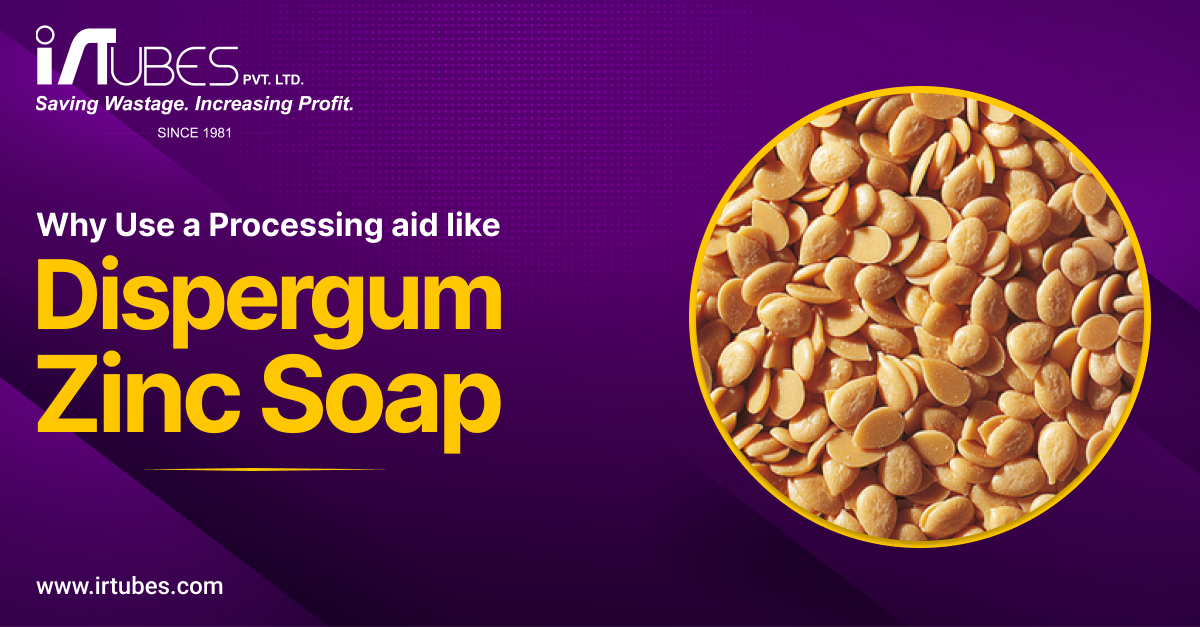In this two-part article, we bring to you why one should use processing aids like Dispergum zinc soaps for NBR and CR and in the next month, the all-important question: How do you know your processing aid is working – this alongside tests to show the efficacy of these processing aids.
The two most common rubbers Nitrile (NBR) and chloroprene rubber (CR) are the most frequently converted into finished rubber products. Methods to do so can be compression, transfer, or injection moulding processes. To improve the flow characteristics specially developed chemical products, used in small quantities can substantially modify the processing characteristics, WITHOUT affecting the mechanical properties of the cured rubber.
The effects of these Speciality processing aids are many.
- Mixing cycles can be shortened as a result of the joint action of peptizing and lubricating effects.
- Batch temperatures are lower
- Compound surface is smoother
- Compounds accept higher filler loadings
- Filler dispersion is improved
- Dry stocks show less tendence towards mill sticking or bagging.
All this leads to energy savings and minimized wear of mixing machinery
During processing
- Extrusion rate can be increased to give higher productivity
- Extrusions show less shrinkage and improve surface appearance
- Injection and cycle times in injection and transfer moulding are shorter, that leads to reduced rejection rate.
- Calendar throughput rates are higher, along with reduced grain effect and smoother surface.
- Scorch is delayed which in turn may allow for higher processing temperature, hence increased throughput.
- Full cure time is often reduced, which enables a more productive usage of presses
- Shelf stability as in the case of CR compounds is improved in microcellular products, pore structure shows a more uniform pattern.
Dispergum Zinc Soaps: As an effective processing aid
We discuss below the different grades of Dispergum Zinc soaps with their properties:
| Dispergum grade | PT | ZK | E |
| Composition | Pure zinc soap on the basis of unsaturated and saturated fatty acids | Special combination of zinc and potassium soaps | Pure zinc soap based predominantly on unsaturated fatty acids |
| Properties |
|
|
|
| Dropping Point (Degrees Centigrade) | 100 | 95 | 83 |
| Ash content (%) | 13.0 | 13.5 | 13 |
| Concentration used (phr) | 2-5 | 3 – 5 | 2 – 5 |
When used as processing aids, Dispergum zinc soaps exert a twofold action
- In NR, IR or compounds containing these rubbers, they show a lubricating and peptizing effect. As a result of the lubricant effect, most rubber compounds, in particular highly loaded and dry stocks, will mix better, quicker and at lower temperatures, take higher filler loadings, process easier and faster, and flow better.
- Dispergum zinc soaps help in filler dispersion and filler activation and in some cases act as cure activators.
Effects of Dispergum zinc soaps on mixing and processing of rubber compounds
Optimizing compound viscosity for easy processing doubtless is of great importance. As stated above compounds should mix, extrude, calendar and inject rapidly and smoothly, without negative effects on dimensional stability. These optimum properties cannot be achieved with fillers alone and only in rare instances with the addition of suitable plasticizers. However, Dispergum zinc soaps are known to offer a safe and practical solution.
The Peptizing action of zinc soaps
Compared to special chemical peptizers, for e.g., those derived from pentachlorothiophenol, the zinc soaps exhibit a milder action. At low working temperatures, the zinc soaps do not initiate any chemical breakdown of rubber chain molecules, which helps to maintain favourable curable rubber properties.
A peptizing effect for practical processing requires higher levels of zinc soaps compared to tru chemical peptizers. However, as zinc soaps are also used for other technological reasons, at levels between 2 and 5 phr, the peptizing action is desirable plus comes at no extra cost. Dispergum zinc soaps reduce viscosity much more than straight plasticizers such as mineral oils.
Good solubility of these soaps presents an advantage as it ensures a quick start of the softening action and results in a highly reproducible and homogenous level of breakdown, which in turn give a smooth compound surface.
The action of these soaps is less dependent on batch temperature than when working with true chemical peptizers. The zinc soap effects are the same at 75 degrees or 100 degrees Centigrade, but can be increased by going to 125 degrees Centigrade or higher. The high efficiency already at lower temperatures makes it possible to increase mixing capacity, to save heating energy and to reduce wear on machinery. The rapid onset of softening action helps to smooth down the usual high and wide initial energy peak in mixing and makes for considerable energy savings.
Dispergum zinc soaps maintain their effectiveness also in sulphur containing compounds. This means it is possible to replasticize high viscosity compounds or even slightly scorched stocks by subsequent action of zinc soaps, and adjust them to safe processing viscosity levels.
The importance of quickly reaching optimum processing viscosity levels need not to be underlined.
Improvements in Mixing
Mill Mixing
When processed on open mills, Dispergum zinc soaps very rapidly form a smooth band that is ready for filler incorporation and a high degree of filler dispersion and overall improved processing properties. This is of particular interest in mineral loaded compounds which normally tend to give difficult processing, rough and dry excessively bagging stocks.
With Dispergum zinc soaps used in rubber compounds for their lubricant action, there is no need for a separate addition of stearic acid as a dispersing agent for fillers. The dispersing effect is also very pronounced with silica fillers: the recommended practice is to use Dispergum zinc soaps in conjunction with basic filler activators such as triethanolamine.
In mill mixing the zinc soaps are added to the rubber in the very first place. After a short working period, the remaining mixing schedule follows in the usual order.
Banbury Mixing
Here, the zinc soaps should be introduced into the mixer along with the rubber and after a short while fillers and chemicals can be added. Again, the usual order of mixing need not be changed. In upside-down mixing, Dispergum zinc soaps (Dzs) are fed into the mixer with the fillers right at the beginning. Stearic acid can be eliminated from compound formulations also in Banbury mixes when working with Dzs.
Both mixing methods, conventional or upside down, will show improved filler dispersion after only short mixing cycles.
An important effect is the dramatic reduction of temperature. For instance, upside down NR compound with 50phr N 330 black showed a temperature lower by 45 degree Centigrade when 5 phr Dispergum N were added. This contributes to considerable savings. The lower batch temperature also facilitates the manufacture of temperature sensitive compounds, such as CR mixes. It also allows for more efficient use of internal mixers and reduced wear of machinery.
Improvement of Flow Properties during processing
Increased Extrusion Rate
It is the lubricant action of Dispergum zinc soaps in natural and synthetic rubber compounds that result in increased extrusion rate.
In a test series, EPDM compounds were mixed without and with 5 phr Dispergum N in a 50 liter mixer and extruded in a hot feed 60mm extruder at a screw speed of 60 rpm. The Dispergum zinc soap generated an increase in extrusion rate of 33%.
The use of 5 phr Dispergum N in this compound with the equipment mentioned above, would increase the length of EPDM profile produced in a month form 47,000 m to 56,800 m – a 21% increase (based on an unchanged density). This advantage does not include savings brought about by shorter mixing and warm up cycles or reduced energy consumption. With these the savings will be higher.
Reduced Injection Time
The addition of 5 phr Dispergum increases flow distance by a factor of 3 to 5, the economical advantages are rather evident.
Improvements in Calendering
Here similar favorable effects are seen as in extrusion of rubber compounds. Sheet surface smoothness, calender grain and throughput rates are improved the same way as are profile surface appearances, die swell and extrusion rate.
Influence on building tack metal bonding and paint adhesion
Due to their good solubility in rubber and contrary to stearic acid, these soaps practically don’t tend to bloom at the surface of compounds and therefore do not build tack or adhesion to other materials. When using Dispergum zinc soaps, stearic acid, often considered as objectionable, can be totally eliminated form compound formulations, as the zinc soaps fully assume the capacity of filler dispersion aids and cure activators.
In exceptional cases of very sensitive compounds, where addition of lubricants could give rise to undesirable side effects, the use of Dispergum L or Dispergum C is recommended.
Dispersing and activating effects of Dispergum zinc soaps
Filler dispersion and filler activation
Dispergum zinc soaps show a definite dispersing action with carbon blacks and mineral fillers. At usual concentration levels, this dispersion action is superior to that of stearic acid.
This in turn results in improved mechanical properties of the cured articles. Especially with silica fillers, the filler dispersing effect cannot be separated from a filler activating effect. Here Dispergum zinc soaps show a slighter activity than basic filler activators. For well-balanced scorch and full cure characteristics, combinations of Dispergum zinc soaps and base activators, such as triethanolamine are recommended.
Cure activation
The activating effect is largely dependent on the nature of the fillers present, their pH, particle size and activity and on the nature of the accelerators used, this has to be established for reach individual case. As a rule, zinc soaps are like stearic acid also in respect to cure activation. The effect is pronounced in combination with light active fillers and with thiazole accelerators i.e. it’s stronger with MBT, MBTS or ZMBT etc. than with sulphenamids, dithiocarbamates or thiruam type accelerators.
Stearic acid level can be decreased down to zero without negatively affecting overall cured rubber properties. Zinc oxide concentration can be reduced in the same way. Taking zinc oxide down to 3 phr hardly leads to any loss of physical properties.
Reducing the ZnO concentration to zero, also is not advisable as several cured rubber properties will be affected, including wear resistance and compression set.
Dispergum zinc soaps in selected applications
In acrylate and epidhlorohydrin rubbers
In difficult processing Speciality rubbers such as ACM, ECO etc. where processing aids are indispensable, Dispergum zinc soaps help avoid mill sticking, rapidly forming a smooth band in mill mixing and speed up filler incorporation.
In Peroxide cured compounds
Here the soaps exert only a minor influence on peroxide curing systems.
In compounds for continuous curing processes
For salt bath (LCM) or microwave (UHF) cure the Dispergum zinc soaps can be used without problems. Even at very high temperatures, the Dispergum zinc soap will not decompose under formation of products that could interfere with the process.
Conclusion
The improved filler dispersion frequently results in superior cured rubber properties, such as higher tensile strength, higher rebound and tear, and low compression set.
Dispergum zinc soaps are tried and tested products, which predominantly act as lubricants and therefore lower the compound viscosity. The products may consist of saturated or unsaturated fatty acids and therefore has the function of internal or external lubricants.
The zinc content may act as an activator for the sulfur vulcanization and Dispergum zinc soaps can therefore partially replace stearic acid.
Depending on the vulcanization system, Dispergum zinc soaps can also aid by having a slightly retarding effect on the sulfur vulcanization.
I R Tubes Pvt. Ltd. is a leading specialty chemical suppliers for the chemical industry. Contact I. R. Tubes on info@irtubes.com or Call: 9689927193 for more information

